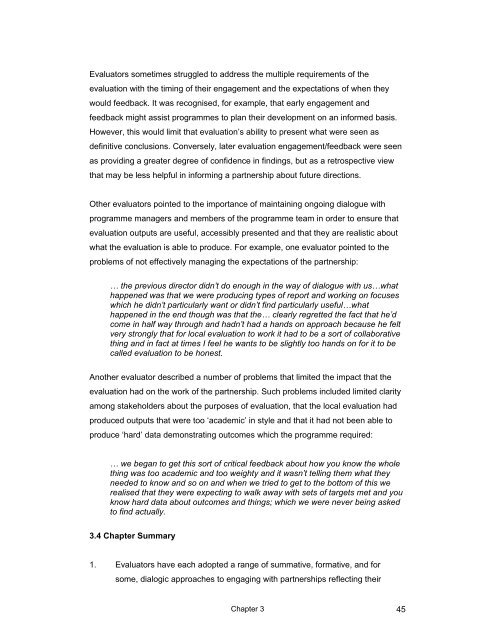Local Evaluation of Children's Services Learning from the Children's ...
Local Evaluation of Children's Services Learning from the Children's ...
Local Evaluation of Children's Services Learning from the Children's ...
- No tags were found...
You also want an ePaper? Increase the reach of your titles
YUMPU automatically turns print PDFs into web optimized ePapers that Google loves.
Evaluators sometimes struggled to address <strong>the</strong> multiple requirements <strong>of</strong> <strong>the</strong>evaluation with <strong>the</strong> timing <strong>of</strong> <strong>the</strong>ir engagement and <strong>the</strong> expectations <strong>of</strong> when <strong>the</strong>ywould feedback. It was recognised, for example, that early engagement andfeedback might assist programmes to plan <strong>the</strong>ir development on an informed basis.However, this would limit that evaluation’s ability to present what were seen asdefinitive conclusions. Conversely, later evaluation engagement/feedback were seenas providing a greater degree <strong>of</strong> confidence in findings, but as a retrospective viewthat may be less helpful in informing a partnership about future directions.O<strong>the</strong>r evaluators pointed to <strong>the</strong> importance <strong>of</strong> maintaining ongoing dialogue withprogramme managers and members <strong>of</strong> <strong>the</strong> programme team in order to ensure thatevaluation outputs are useful, accessibly presented and that <strong>the</strong>y are realistic aboutwhat <strong>the</strong> evaluation is able to produce. For example, one evaluator pointed to <strong>the</strong>problems <strong>of</strong> not effectively managing <strong>the</strong> expectations <strong>of</strong> <strong>the</strong> partnership:… <strong>the</strong> previous director didn’t do enough in <strong>the</strong> way <strong>of</strong> dialogue with us…whathappened was that we were producing types <strong>of</strong> report and working on focuseswhich he didn’t particularly want or didn’t find particularly useful…whathappened in <strong>the</strong> end though was that <strong>the</strong>… clearly regretted <strong>the</strong> fact that he’dcome in half way through and hadn’t had a hands on approach because he feltvery strongly that for local evaluation to work it had to be a sort <strong>of</strong> collaborativething and in fact at times I feel he wants to be slightly too hands on for it to becalled evaluation to be honest.Ano<strong>the</strong>r evaluator described a number <strong>of</strong> problems that limited <strong>the</strong> impact that <strong>the</strong>evaluation had on <strong>the</strong> work <strong>of</strong> <strong>the</strong> partnership. Such problems included limited clarityamong stakeholders about <strong>the</strong> purposes <strong>of</strong> evaluation, that <strong>the</strong> local evaluation hadproduced outputs that were too ‘academic’ in style and that it had not been able toproduce ‘hard’ data demonstrating outcomes which <strong>the</strong> programme required:… we began to get this sort <strong>of</strong> critical feedback about how you know <strong>the</strong> wholething was too academic and too weighty and it wasn’t telling <strong>the</strong>m what <strong>the</strong>yneeded to know and so on and when we tried to get to <strong>the</strong> bottom <strong>of</strong> this werealised that <strong>the</strong>y were expecting to walk away with sets <strong>of</strong> targets met and youknow hard data about outcomes and things; which we were never being askedto find actually.3.4 Chapter Summary1. Evaluators have each adopted a range <strong>of</strong> summative, formative, and forsome, dialogic approaches to engaging with partnerships reflecting <strong>the</strong>irChapter 3 45
















